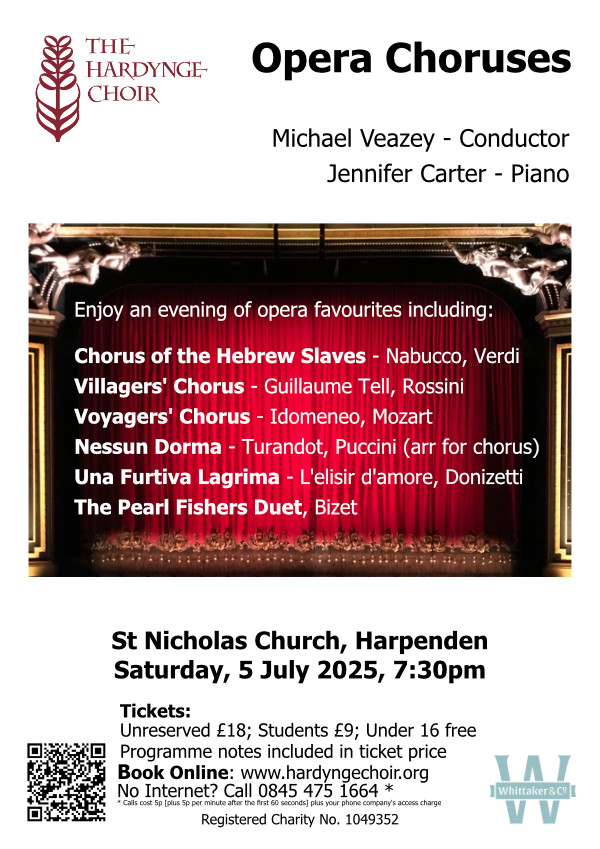Opera Choruses
7:30pm, Sat, 5 Jul 2025
- Event Details
-
Type of event: Performance Start time: 7:30pm Venue: St Nicholas Church, Harpenden, Church Green, Harpenden, AL5 2SP Description: 
An evening of popular choruses, arias and a duet, from well known romantic and dramatic operas, in the beautiful surroundings of St Nicholas Church, Harpenden.Jordan Wilson - Tenor
Edward Walters - Baritone
Jennifer Carter - PianoMichael Veazey - Conductor
Enjoy the highlights listed below.
Una furtiva lagrima (A furtive tear), a tenor aria from Donizetti's comic opera, L'elisir d'amore (The Elixir of Love), is sung by Nemorino when it appears that the love potion he bought to win the heart of his dream lady, Adina, is working.
Come Paride Vezzoso (Just as the charming Paris) is a baritone aria in the first act of Donizetti's opera, L'elisir d'amore. This famous aria is sung by the self-important Sergeant Belcore who appears with his regiment and immediately sets about courting Adina in front of everyone; he pulls out all the stops,Les pêcheurs de perles (The Pearl Fishers) is a three-act opera by Georges Bizet, The opera tells the story of how two men's vow of eternal friendship is threatened by their love for the same woman, whose own dilemma is the conflict between secular love and her sacred oath as a priestess. The friendship duet, "Au fond du temple saint", generally known as The Pearl Fishers Duet, is one of the best-known in Western opera.
Chorus of the Hebrew Slaves, also known as "Va, pensiero", is a chorus from Giuseppe Verdi's opera Nabucco. It recollects the period of Babylonian captivity after the destruction of Solomon's Temple in Jerusalem in 586 BC. Some critics believe that Verdi deliberately makes parallels in this opera between the Hebrews and the Italians, who in Verdi's time were living, some say suffering, under Austrian rule.
Nessun dorma (Let no one sleep) is an aria from the final act of Puccini's opera Turandot, and one of the best-known tenor arias in all opera, sung by Calaf, il principe ignoto (the unknown prince), who falls in love at first sight with the beautiful but cold Princess Turandot. Any man who wishes to wed Turandot must first answer her three riddles; if he fails, he will be beheaded. In the aria, Calaf expresses his triumphant assurance that he will win the princess. Hardynge choir will sing an arrangement for four-part choir.
Guillaume Tell, Rossini's last opera, drew on the William Tell legend. The opera opens with the Villagers’ Chorus; they sing happily as they prepare the village for three weddings.
Idomeneo was written and premiered in 1781 when Mozart was 25 years old. On his way home from the Trojan wars, in a boat lashed by terrible storms, Idomeneo vows to sacrifice the first person he meets upon returning home. To his horror this turns out to be his son, Idamante. Idomeneo decides to send Idamante away on a ship, hoping to avoid the issue: at this point in the "Voyagers’ Chorus" the voyagers sing of the placid, calm waters.



